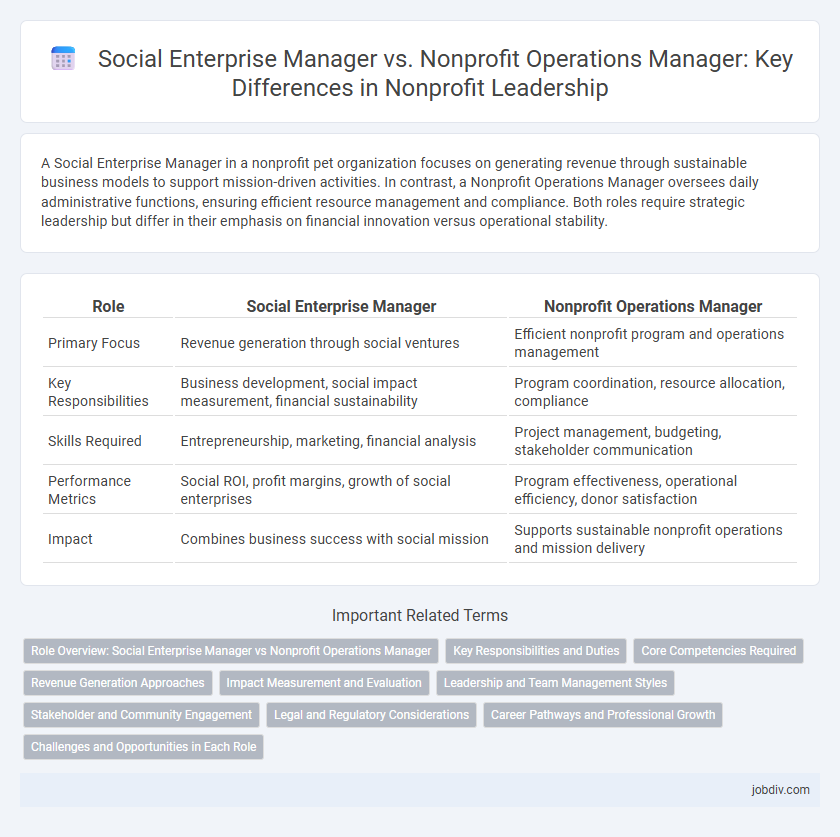A Social Enterprise Manager in a nonprofit pet organization focuses on generating revenue through sustainable business models to support mission-driven activities. In contrast, a Nonprofit Operations Manager oversees daily administrative functions, ensuring efficient resource management and compliance. Both roles require strategic leadership but differ in their emphasis on financial innovation versus operational stability.
Table of Comparison
| Role | Social Enterprise Manager | Nonprofit Operations Manager |
|---|---|---|
| Primary Focus | Revenue generation through social ventures | Efficient nonprofit program and operations management |
| Key Responsibilities | Business development, social impact measurement, financial sustainability | Program coordination, resource allocation, compliance |
| Skills Required | Entrepreneurship, marketing, financial analysis | Project management, budgeting, stakeholder communication |
| Performance Metrics | Social ROI, profit margins, growth of social enterprises | Program effectiveness, operational efficiency, donor satisfaction |
| Impact | Combines business success with social mission | Supports sustainable nonprofit operations and mission delivery |
Role Overview: Social Enterprise Manager vs Nonprofit Operations Manager
A Social Enterprise Manager focuses on blending business strategies with social impact goals, driving revenue-generating activities that support the mission sustainably. A Nonprofit Operations Manager oversees day-to-day organizational functions such as program implementation, financial management, and staff coordination to ensure effective service delivery. Both roles require strategic leadership but differ in their emphasis on commercial enterprise versus nonprofit operational efficiency.
Key Responsibilities and Duties
A Social Enterprise Manager drives mission-aligned business ventures, focusing on revenue generation, impact measurement, and stakeholder engagement to sustain social programs. In contrast, a Nonprofit Operations Manager oversees internal functions such as budgeting, compliance, staff management, and organizational efficiency to support the nonprofit's mission. Both roles require strategic planning, but the Social Enterprise Manager emphasizes entrepreneurial activities while the Operations Manager prioritizes operational stability and resource allocation.
Core Competencies Required
Social Enterprise Managers excel in business acumen, strategic innovation, and impact measurement to balance profitability with social goals. Nonprofit Operations Managers prioritize fundraising expertise, volunteer coordination, and compliance with regulatory frameworks to ensure mission-driven effectiveness. Both roles require strong leadership, financial oversight, and stakeholder communication but differ in their approach to sustainability versus mission execution.
Revenue Generation Approaches
Social Enterprise Managers drive revenue through innovative business models that combine social impact with commercial strategies, leveraging product sales, service fees, and partnerships to create sustainable income streams. Nonprofit Operations Managers primarily focus on grant writing, donor management, fundraising events, and government funding to support organizational expenses and program delivery. Both roles require strategic financial planning but differ in balancing earned income approaches versus traditional philanthropic revenue sources.
Impact Measurement and Evaluation
Social Enterprise Managers emphasize impact measurement through market-driven metrics, tracking social return on investment (SROI) alongside financial sustainability indicators. Nonprofit Operations Managers focus on outcome evaluation using qualitative and quantitative data to assess program effectiveness and community impact. Both roles integrate data analysis to drive strategic decisions, but Social Enterprise Managers align impact evaluation with business models while Nonprofit Operations Managers prioritize mission-driven performance metrics.
Leadership and Team Management Styles
Social Enterprise Managers emphasize entrepreneurial leadership, fostering innovation and sustainable business practices while aligning team goals with social impact missions. Nonprofit Operations Managers prioritize collaborative leadership, focusing on resource optimization and mission-driven team cohesion to ensure efficient program delivery. Both roles require adaptive management styles, but Social Enterprise Managers often leverage market strategies, whereas Nonprofit Operations Managers concentrate on community engagement and stakeholder relationships.
Stakeholder and Community Engagement
A Social Enterprise Manager drives stakeholder and community engagement by integrating social impact goals with business strategies, fostering partnerships that enhance sustainable development and revenue generation. In contrast, a Nonprofit Operations Manager focuses on optimizing internal processes and resource allocation to support mission-driven programs, prioritizing accountability to donors, volunteers, and beneficiaries. Both roles require strong communication skills, but the Social Enterprise Manager emphasizes market-based solutions, while the Nonprofit Operations Manager centers on community service and program effectiveness.
Legal and Regulatory Considerations
Social Enterprise Managers navigate a complex blend of commercial and nonprofit legal frameworks, ensuring compliance with both business regulations and charitable laws, including tax implications unique to hybrid models. Nonprofit Operations Managers concentrate on adherence to nonprofit-specific legal requirements such as IRS 501(c)(3) guidelines, grant reporting standards, and nonprofit governance policies. Both roles demand rigorous oversight of regulatory compliance but differ in managing business income restrictions versus purely charitable mission alignment.
Career Pathways and Professional Growth
Social Enterprise Managers typically advance by integrating business strategies with social impact goals, often transitioning into leadership roles within hybrid organizations or scaling for-profit social ventures. Nonprofit Operations Managers focus on optimizing organizational efficiency, progressing into executive positions such as Director of Operations or Chief Operating Officer in mission-driven nonprofits. Both career pathways emphasize strategic management skills, but Social Enterprise Managers blend commercial acumen with social responsibility while Nonprofit Operations Managers specialize in nonprofit program implementation and resource administration.
Challenges and Opportunities in Each Role
Social Enterprise Managers balance generating revenue through market-driven approaches while advancing social missions, facing challenges in securing sustainable funding and measuring social impact; however, they gain opportunities to innovate and scale social solutions with entrepreneurial strategies. Nonprofit Operations Managers focus on optimizing organizational processes, ensuring compliance, and managing resources efficiently, confronting issues such as limited budgets and staff capacity; they benefit from creating strong operational frameworks that enhance program delivery and stakeholder trust. Both roles require adaptive leadership and strategic problem-solving to navigate the evolving nonprofit landscape and drive mission success.
Social Enterprise Manager vs Nonprofit Operations Manager Infographic

 jobdiv.com
jobdiv.com